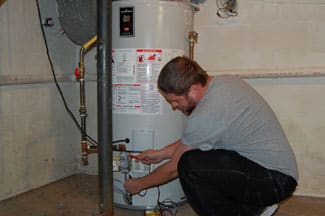Handling Everyday Water Heater Issues
Handling Everyday Water Heater Issues
Blog Article
Each person maintains their unique perception when it comes to Common Problems with Your Home Water Heater.

Imagine starting your day without your routine hot shower. That already sets a bad tone for the rest of your day.
Every residence requires a trustworthy water heater, but just a couple of recognize how to take care of one. One easy method to maintain your hot water heater in top shape is to check for mistakes frequently and also repair them as quickly as they show up.
Remember to shut off your water heater before sniffing around for faults. These are the water heater faults you are most likely to encounter.
Water too hot or too cool
Every hot water heater has a thermostat that determines exactly how hot the water gets. If the water entering into your home is too warm in spite of setting a practical maximum temperature level, your thermostat could be malfunctioning.
On the other hand, too cold water might be because of a failed thermostat, a busted circuit, or inappropriate gas flow. For example, if you make use of a gas hot water heater with a broken pilot light, you would obtain cold water, even if the thermostat is in excellent condition. For electric heating systems, a blown fuse might be the offender.
Not nearly enough hot water
Water heaters can be found in several dimensions, depending on your hot water needs. If you lack hot water before everybody has actually had a bathroom, your water heater is also tiny for your family size. You need to take into consideration mounting a bigger hot water heater storage tank or selecting a tankless water heater, which takes up less room as well as is much more durable.
Weird noises
There go to the very least five sort of noises you can hear from a hot water heater, however one of the most common interpretation is that it's time for the water heater to retire.
First off, you must be familiar with the typical appears a water heater makes. An electrical heater may appear various from a gas-powered one.
Popping or banging audios generally suggest there is a piece of sediment in your containers, and also it's time to clean it out. On the other hand, whistling or hissing noises might merely be your shutoffs allowing some stress off.
Water leakages
Leakages can originate from pipes, water links, shutoffs, or in the worst-case scenario, the tank itself. Over time, water will wear away the container, and also discover its escape. If this occurs, you need to change your hot water heater immediately.
Nevertheless, prior to your adjustment your entire storage tank, be sure that all pipelines remain in location and that each shutoff works perfectly. If you still require assistance identifying a leakage, call your plumber.
Rust-colored water
Rust-colored water indicates one of your water heater elements is corroded. Maybe the anode rod, or the storage tank itself. Your plumber will certainly be able to determine which it is.
Lukewarm water
Regardless of just how high you set the thermostat, you won't obtain any hot water out of a heater well past its prime. A water heater's efficiency might minimize with time.
You will likewise obtain warm water if your pipes have a cross connection. This indicates that when you activate a faucet, warm water from the heating system moves in along with routine, cold water. A cross link is simple to area. If your hot water taps still follow closing the hot water heater valves, you have a cross connection.
Discoloured Water
Corrosion is a significant source of filthy or discoloured water. Rust within the water tank or a failing anode rod could create this discolouration. The anode rod protects the container from rusting on the inside as well as ought to be examined annual. Without a pole or an effectively working anode rod, the warm water quickly rusts inside the tank. Get in touch with a specialist water heater service technician to determine if replacing the anode rod will certainly deal with the problem; if not, change your hot water heater.
Final thought
Ideally, your water heater can last ten years before you need a modification. However, after the 10-year mark, you may experience any of these faults much more consistently. At this point, you ought to add a brand-new hot water heater to your spending plan.
How To Troubleshoot 3 Common Water Heater Problems in Twin Cities
The Water Heater Is Leaking
A leaky cold water inlet valve A loose pipe fitting A leaky temperature and pressure relief valve A corroded anode rod A cracked tank Turn Off Your Water Heater:
Shut off your gas water heater by turning the gas valve on the unit to the “OFF” position. Shut off your electric water by switching its power off at your electrical panel. Look for a two-pole breaker labeled “water heater” and turn it to the “OFF” position. Move the ball valve connected to the water heater to be perpendicular to the piping at a 90° angle. Look for the Leak:
Depending on whether the water is coming from the tank's top or bottom, you’ll want to look for the leak in different locations.
If the leak comes from the top of the tank, carefully look for water escaping from the cold water inlet valve or loose pipe fittings. Rusted hot and cold water valves can have loose connections with the tank, with water leaking out of them.
https://mspplumbingheatingair.com/blog/how-to-troubleshoot-3-common-water-heater-problems
We were made aware of that report on Water Heater Repair and Troubleshooting through a friend on our other web property. Be sure to take the opportunity to share this entry if you liked it. Many thanks for your time spent reading it.
Expertise? Call us! Report this page